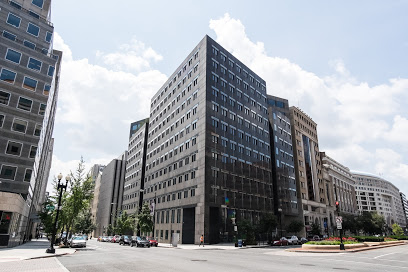Meeting Location
AAAS Building Entrance at 12th & H streets
Meeting ProgramThemed ‘Honoring our History, Forging our Future,’ the 2017 Annual Meeting of the International Neuroethics Society will gather a diverse group of scholars, scientists, clinicians, and professionals dedicated to the responsible use of advances in brain science. Join old friends and new colleagues for an intellectually stimulating and dynamic conference that pays homage to the first 15 years of neuroethics and highlights critical topics that will shape its future.
Thursday, November 9
1:00–1:05 PMWelcome
Plenary Lecture (1:05–1:35 PM)Rémi QuirionChief Scientist of Québec
1:35–3:00 PMNeuroscience, Communication, and Public EngagementEvery day, newspapers, television, radio and social media carry stories about the brain. Advances in neuroscience, mental health, new technology, neurodegeneration provide a rich resource for journalists and broadcasters. There is no doubt that people are fascinated by the brain in health and disease. As brain research finds its way into the classroom, office, courts and the home, how can experts stimulate public discussion and debate about the social, legal and ethical aspects and implications of brain research? What are the opportunities for scientists to communicate with the public? And what are the responsibilities today's experts have to get their message across in a meaningful way? For those just starting out in their careers, how can they get involved?
Break (3:00–3:30 PM)
3:30–5:00 PMAmbassador Session: Reflecting on our International Roots and Planning our Collaborative FuturesThe International Ambassador Program aims to facilitate greater global representation in the Society by recruiting leading scholars and thought leaders in neuroethics to act as liaisons between their respective local neuroethics efforts and the INS. Convening these leaders has become especially important as countries across the globe have made a clear priority to embed neuroethics scholarship and research in these projects or to emphasize its role in parallel. The program and annual meeting activities celebrate INS's commitment to international dialogue on critical issues at the intersection of neuroscience, society, and ethics. Panelists for this year's session include representatives from national-level funded project for neuroscience, as well as embedded ethicists within those projects, and will discuss how neuroethics questions addressed within each project reflect the cultural context of the countries in which they are situated. The session will serve as an idea incubator and include a group discussion for deeper, actionable collaboration across projects and across institutions.
Break (5:00–5:30 PM)
Public Program (5:30–7:00 PM)To Tell the Truth!This panel discussion was organized in collaboration with the INS, the Dana Alliance for Brain Initiatives, and the American Association for the Advancement of Science (AAAS). The event is open to the public. RSVP when registering for the INS meeting or through the separate AAAS registration form.
7:00–8:00 PMEvening Reception
Reservation (8:30 PM)Affinity Group DinnersConfirm details and your participation at the registration table.
Friday, November 10
Breakfast (7:30–8:30 AM)
7:45–8:30 AMPoster JudgingDuring breakfast, judges will be evaluating poster presentations. Posters must be installed by 7:45 a.m. to be eligible for prizes and presenters should be available during breakfast to give a quick overview for the judges. Contact INS staff to volunteer to serve as a judge.
8:30–8:35 AMWelcomeCynthia Kubu, INS Program Committee Co-Chair
8:35–8:45 AMSteven E. Hyman Award for Distinguished Service to the Field of NeuroethicsJudy Illes, INS President, will present the award in honor of the late William Safire, accepted by The Dana Foundation
Plenary Lecture (8:45–9:15 AM)Arthur CaplanNew York University Langone Medical Center
9:15–10:30 AMThe Brain in ContextA multidisciplinary discussion of the brain in its physical and social environment. Brains exist not in static isolation, but in a constant state of neurodevelopment. Brain development is impacted by environmental factors, and the context of lived experience is embodied through the brain. The speakers on this panel will consider the impact of physical and social environments on the human brain, and the impact of the human brain on those environments in turn. In this way they explore how people and societies impact each other, and how brains develop across the lifecycle in a range of social environments.
Break (10:30–11:00 AM)
11:00 AM–12:15 PMLegal Responsibility, Agency, and Addiction Neuroethics: Reconciling Frameworks for PolicymakingThe speakers on this panel will bring together medical, neurophilosophical, and judicial viewpoints to explore how neurological and biopsychosocial frameworks for addiction relate to legal constructs and social policies that assign responsibility. Understanding addiction as a brain-based disease presents unique challenges to the criminal justice system, which must assign responsibility and punishment for what amounts to the hallmark symptoms of an illness. Yet real-world alternatives to mandatory incarceration for drug-related criminal offenses, from drug courts that mandate treatment to full decriminalization, are also neuroethically fraught. For example, from both clinical and societal perspectives, it is problematic to absolve individuals of the consequences of their behavior; similarly, compulsory submission to treatment may violate patient autonomy and compromise treatment efficacy. Ultimately, the issue of addiction sits at the nexus of questions about moral agency, volition, autonomy, responsibility, and the distribution of justice under various social policies.
Lunch (12:15 AM–1:30 PM)
12:30–1:15 PMMentoring RoundtablesDuring lunch, the INS Program and Student/Postdoc committees are hosting a mentoring roundtable activity. Mentors will lead an open discussion and provide insights and advice about writing, grant applications, and jobs / career tracks in the field of neuroethics. If you would like to participate as a mentor or mentee, please indicate your availability when registering for the meeting.
Concurrent I (1:30 PM–2:15 PM, AUDITORIUM)Ethics of Neuroscience and Neurotechnology
Concurrent II (1:30 PM–2:15 PM, REVELLE)Neuroscience of the Law
Rising Star Plenary Lecture (2:15–2:45 PM)Karola KreitmairStanford University
2:45–3:20 PMFlash Poster Presentations
3:20–4:20 PMPoster SessionBrowse poster presentations and network with authors and colleagues. Reference the complete list of accepted abstracts or the onsite list poster presentations for additional details.
Fred Kavli Distinguished Neuroethics Lecture (4:20–5:00 PM)Patricia ChurchlandUniversity of California, San Diego, Emeritus
5:00–6:00 PMBusiness Meeting / Awards Presentation
6:00–7:30 PMClosing Reception
Attendees must register to participate in this event. Online registration is now closed. Register when arriving Thursday or Friday. Registration Rates |

